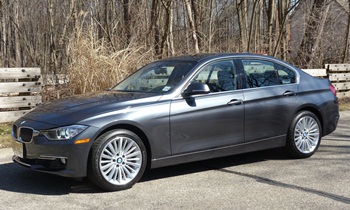For over 30 years, the BMW 3-Series has been the compact sport sedan everyone else has been gunning for. For 2012, the sedan has been totally redesigned. Has BMW once again raised the bar? Or have they lost their way, perhaps even choked?


For over 30 years, the BMW 3-Series has been the compact sport sedan everyone else has been gunning for. For 2012, the sedan has been totally redesigned. Has BMW once again raised the bar? Or have they lost their way, perhaps even choked?

To tell the new 3 apart from the 5, look at the area where the headlights meet the grille. more 3-Series photos
| Compared to the C-Class | |
| Fuel economy |
 Better
Worse
Better
Worse
|
No, this isn't a mistake. Nothing surprised me more about the new BMW 328i than the fuel economy numbers reported by its trip computer--even cresting 40 once for the suburban trip home from my kids' school when the traffic signals were in my favor. In casual suburban driving you can expect high 20s and low 30s. Credit the combination of a new 240-horsepower turbocharged 2.0-liter four-cylinder engine, an eight-speed automatic transmission, an "Eco Pro" driving mode that encourages a light right foot, and an automatic stop/start system (which could operate more smoothly). Some caveats: the engine seems to get much worse fuel economy while warming up in cold weather, and a heavy right foot can send the numbers into the high teens. The EPA has revised its numbers for the 328i downward from 24 city / 36 highway to 23/33, putting it even with the 335i. My real-world testing suggested that the four goes two to seven miles farther on a gallon of gas than the six.
| Powertrain performance |
 Better
Worse
Better
Worse
|
Quite a few current cars can deliver mpg's over 30. What makes the new BMW 328i special is that it delivers excellent fuel economy and strong performance in the same car, if not necessarily at the same time. The 328i's turbo four might not appear nearly as strong as the 335i's turbo six on paper, as it's down 60 horsepower (240 vs. 300), but in the real world the two engines aren't far apart. BMW's official zero-to-sixty times get the six to sixty only about a half-second sooner. The six is smoother and sounds better (the four sounds almost like a diesel at idle). But are these advantages worth $3,700 and a substantial fuel economy hit? Only if you can't stomach the idea of a four-cylinder engine in a car that starts north of $35,000 and tops $50,000 when loaded up.
| Rear seat room & comfort |
 Better
Worse
Better
Worse
|
Another surprising strength for the new BMW 3-Series. There's more room in back than in competing cars, and the seat is comfortably positioned and shaped.
| Cargo capacity |
 Better
Worse
Better
Worse
|
The surprises continue. The trunk has grown a lot with the redesign, to 17 cubic feet, making it easily the largest in the segment. One controversial enabler: no spare tire is offered.
| Handling |
 Better
Worse
Better
Worse
|
BMW's key advantage has traditionally been handling. The new 3-Series continues to handle better than the competition in Sport Line form (which also includes some must-have sport bucket seats with power-adjustable bolsters). With less weight over the front wheels, the 328i feels more agile than the 335i.
| Compared to the C-Class | |
| Price or payments |
 Better
Worse
Better
Worse
|
The 2012 328i starts at $35,795, and options can put it up to fifty. Adjusted for feature differences, the 2012 is about $1,300 more than the 2011, and the 2011 was already the most expensive car in the segment. A similarly-equipped Infiniti G37 (no need to bother with the weak sauce G25) runs about $4,000 less after adjusting for feature differences.
| Controls and instruments |
 Better
Worse
Better
Worse
|
No, the problem here isn't BMW's infamous iDrive system. They've refined the knob-driven menus to the point that they're easy to navigate. Instead, my beef is with a more recent BMW innovation, the automatic transmission's joystick-like shifter. The lever feels cheap and pushing forward from park to engage reverse runs counter to convention. If you need to display instructions for how to use the shifter, something's wrong.
| Handling |
 Better
Worse
Better
Worse
|
Yes, I have handling among the "pros." But the situation here isn't all good. With the standard suspension body motions aren't tightly controlled, and the car can even feel floaty. The new electric-assist power steering feels numb; better feedback in channeled through the seat. Even with the Sport Line's sport suspension and $900 adaptive dampers (which probably aren't worth the money) the new 3 doesn't feel as "tied down" or as precisely controlled as past 3s. So while the 328i might still out-handle competitors, it won't feel as good while doing so. A tight connection with the car proves elusive.
With the new 2012 328i, BMW clearly tried to engineer a car that would do everything very well, and they came surprisingly close to achieving this impossible task. But something has also been lost in the subjective driving experience. The new 3-Series isn't as engaging as previous generations.
See more 2012 BMW 3-Series photos
One-week loan. BMW provided an insured car with a tank of gas.